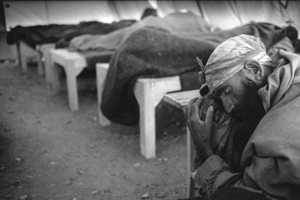
|
Brice de le Vingne had been working in Afghanistan for three weeks as an MSF field coordinator when he had to evacuate from Mazar-i-Sharif a few days after the September 11 attacks in the United States. He then went to the "Tribal Areas" on the Pakistani-Afghan border to assess possible sites for refugee camps. Currently working in Tajikistan on humanitarian access to the war-torn country, he is eager to return to northern Afghanistan.
Brice is from Belgium and has volunteered with MSF as a logistician in Africa (Guinea) and in Indonesia, where he often crossed the frontlines to help provide emergency assistance to both Muslims and Christians.
In the seven provinces of northern Afghanistan, there are between 500,000 and 1 million internally displaced persons. Thirty minutes out of the Afghan city of Mazar-i-Sharif, 10,000 of them have taken refuge in a camp, on desert-like territory allotted by the government. I have never seen people with such few belongings. They have nothing. They lost or sold everything because of the drought. The families live under blankets pulled over a few wooden sticks. They have no more livestock, no food provisions, and no source of income.
MSF was covering the medical needs of this population, in collaboration with the Ministry of Health. But last summer, anticipating a humanitarian crisis in the winter, MSF decided to open an emergency shelter program. During a visit to Mazar, David, an MSF water and sanitation engineer responsible for the program, showed me around. The program consisted in giving displaced families the means to build their own homes: tools, water (that we trucked in) to make mud, and wood. We could feel how pleased they were to receive some attention and assistance.
The families who received the materials immediately set to work. They dug one meter below ground level for some protection from the cold, built up mud walls, and used the wood for roofing. MSF staff in Mazar saw them make 300 homes, and they were still at work when we had to leave in early September.

|
We also gave them tools, wood, and woven straw to build latrines. They made 1,200 of them in a month. I was surprised that the latrines were left intact. They could have taken the raw materials and sold them, but they built the latrines and did not touch them. I think it reveals how much they wanted to regain a minimal sense of dignity.
When I think of these people now, I think of the extremely harsh conditions they will soon face. Temperatures are already dropping and in December it will be -10°C. They can't build houses any more—the mud won't dry. And if they wanted to escape fighting or economic conditions and flee to other countries, I don't think practically and physically they could: many of them are too poor and too weak to travel.
MSF programs throughout much of Afghanistan continue to run thanks to our national staff, and we were able to bring in a cargo from Turkmenistan to Mazar before the air strikes began. It contained food for the therapeutic feeding centers and medical supplies, which we then distributed to the provinces in the northeast. The difference is that since the departure of MSF international staff from Taliban-held provinces in Afghanistan, our programs are running on a maintenance mode. As a result, we are not able to adapt or respond to new, acute needs. For example, we haven't been able to open six planned new clinics, in order to give people living in very isolated areas in the provinces of Kunduz, Dakhar, and Banglan access to basic health care.
On September 11, I was in Kunduz with two other foreign volunteers. It was about 10 o'clock at night when we received a satellite phone call from our head of mission, Stephan, based in Mazar. The line was very poor and I just heard him speak in a tone of urgency about "massive attacks on the United States", then the line cut off. Our local staff listened to the BBC in Farsi and gave us more information. Bin Laden's name kept coming up in the radio broadcasts.
We got another call from Stephan telling us to leave Kunduz at 6 a.m. the next day and travel to Mazar. I held a meeting with our national staff to tell them we were leaving. The Taliban were already saying that they could no longer guarantee our security. We arranged the departure quietly, in a smooth fashion, so as not to raise any panic. I packed all my personal belongings, including 20 books—mainly novels and MSF guidelines—because I didn't think I'd be able to return. But everything else we left behind: cars, computers, equipment, money… The national staff are highly qualified and well trained, and they are used to running the programs on their own. They regularly do so for periods up to three weeks, because the foreign staff has to rotate between three MSF bases in different cities.
Our team of 18 international volunteers all gathered in Mazar on September 12. That same day, the ten female volunteers took a International Committee of the Red Cross (ICRC) flight to Peshawar, Pakistan. The following day, the remaining four males also left by MSF vehicles to neighboring Turkmenistan. When we were down to four, Stephan called a meeting and asked us to spend the day reflecting on the individual reasons why we would like to stay or leave, and considering our personal limits and our threshold.
I wanted to stay. I was calm and well rested, and things were quiet in Mazar. But in the office, the images and commentaries coming out of the TV set told only stories of chaos. And family members and friends were calling to pressure us to "get out of there" as soon as possible. Some were angry and screamed that we were out of our minds.
I got on a computer to write an e-mail to a friend and give her some news so she wouldn't worry. At that moment, when I started writing, I noticed my hands were shaky. When you're in a situation, you just live it and you cope. But when you have to explain it to someone else, you take a step back, and you try to have a more objective viewpoint. Perhaps that's why I was shaky.
Still, I preferred to stay. I thought about how we could seek safety in our bunkers stocked with food, in case of fighting within the country or retaliatory attacks from Americans. I thought it was important to keep working, supporting our national staff, and running the programs. I thought: it can be done.
For about eight hours we didn't speak much to each other. We were all absorbed in our own thoughts, in writing and speaking to family, friends, MSF field staff and MSF headquarters. Stephan went to see the two last foreign members of ICRC. Already there were no more ICRC flights out of Mazar.
There were two main reasons why at the end of the day, we decided it was best to leave. The first was that, if we stayed, we were going to be the only foreign aid workers in the Taliban-held territory of Afghanistan. This could potentially expose us to attacks from groups with anti-western sentiments, and we would be an easy target. The second reason, connected to the first, is that we would be putting national staff at risk.
On Friday, a day of prayer and often, of demonstrations, we decided to stay put. In the evening I played some video games. Then I turned off our PlayStation 2 and zapped a few television channels for the latest news. I was surprised and honestly amused to hear a Western correspondent report that all foreign aid workers had evacuated the country. On Saturday morning, September 15, we began our two-day drive out of Afghanistan to Ashgabat, the capital of Turkmenistan.
It has been more than a month now. I'm eager to get back into Afghanistan, and to meet and work again with the staff there. I think MSF has an added value in the country, because we provide assistance to both sides, the Taliban and the Northern Alliance, and our neutrality is known. In the past, we've had members of the same team shuttling between the capital of a province held by the Northern Alliance and other provinces held by the Taliban. In August of 2000, when Taloqan fell to the Taliban, many international offices were raided, but MSF's was spared.
Unfortunately, a few of our MSF offices in Afghanistan were recently looted. We don't know who the armed men were. But I hope they're enjoying our PlayStation!
My friends at MSF who worked in Afghanistan all came back for a second mission. It's their fault I'm here on stand-by (he laughs). The mountains may be beautiful, but that's not what they came back for. It's for the people we work for, and the people we work with.




